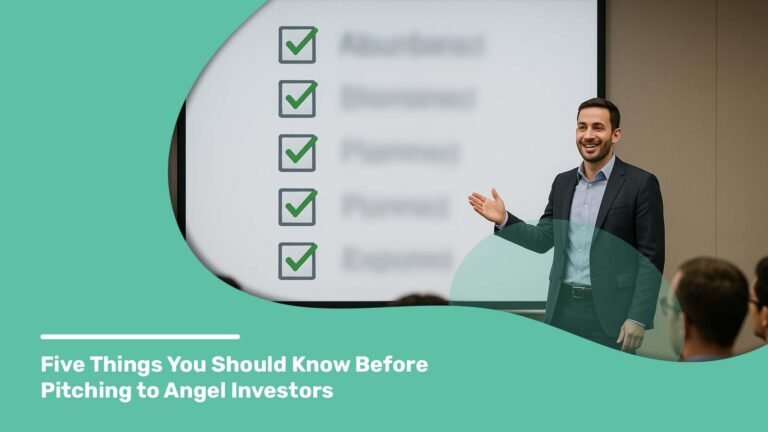Introduction
So, you’re getting ready to talk to investors. You’ve got a great idea, maybe even a product or a few early customers. But here’s the thing — investors don’t just care about your idea. They care about how you explain it. What you say (and what you leave out) can decide whether they trust you or not.
Many people think fancy slides or big words will do the trick. But real investors want something else — they want to understand you, your idea, and your plan. That’s it. This blog will walk you through what really matters when you speak to investors.
Let’s get started.
What Do Investors Want to Hear First?
Investors are busy. They hear many pitches. So, they want to know right away: What problem are you solving?
Don’t start with your app features or your team’s background. Start with the pain point. Make them feel the problem first. If they understand the problem, they will care about your solution.


Say this: “People wait 45 minutes in line at hospitals just to fill one form. We fix that.”
Avoid this: “We built a cloud-based, AI-powered SaaS tool that integrates with form systems.”
Investors love a clear starting point.
When you start with the real-world problem, investors feel the need. It grabs their attention early. It also shows that you understand the space you’re working in. When you speak about the problem right away, it shows you understand the space. It helps investors connect quickly with your purpose. Keep it short, simple, and real.
Should You Talk Numbers Early?
Yes — but not too early. Investors do care about numbers, but they want to hear the story first. Then, they want to see proof.
If you already have revenue or users, share those numbers. But only after they understand your idea.

Say this: “In the last 6 months, over 2,000 users signed up, and 800 are paying.”
Avoid this: Starting your pitch with 20 slides of graphs and financials.
Numbers give your story strength.
Good numbers help show that your idea is working. They add truth to your story. But always let the story lead and the numbers support it — not the other way around. Sharing data shows you’re growing and thinking ahead. But numbers should follow your story, not lead it. Use them to support your main points.
Is There Anything You Should Not Say?
Yes! Some things can make investors lose interest fast.
Avoid these lines:
- “We have no competitors.” (This shows you didn’t research.)
- “Our market is everyone.” (Too broad.)
- “We just need your money to make this work.” (Sounds needy.)
Instead, speak with confidence. Show that you’ve thought things through. It’s okay to say, “We’re still testing this” or “We’re learning.” That shows honesty.

What you avoid matters as much as what you say.
Some words and phrases can create doubt. That’s why knowing what not to say is just as important. Honest, thoughtful answers help build trust and show maturity. Saying too much or sounding too proud can turn people away. Be calm, be honest, and show that you’ve done your research. Investors want real, not perfect.
How Much Should You Talk About the Team?
Investors invest in people more than ideas. So yes, your team matters — but keep it simple.
Say who’s doing what, and why they’re the right person for that role. Don’t list every past job. Focus on skills and passion.
Say this: “I worked at a clinic for 5 years and saw this problem every day. That’s why I started this.”
Avoid this: Long bios and titles that don’t match the current business.
Show the ‘why’ behind your team.
People invest in people they trust. When you share why your team cares about this idea, it adds heart to your pitch. It makes your business feel real and grounded. When you tell a short story about your team’s connection to the problem, it feels more human. Investors invest in people they believe in. Help them believe in you.
Should You Use Big Words or Keep It Simple?
Keep it simple. Always.
Many founders think using big words will sound smart. But most investors are not impressed by jargon. They want to understand your business in one minute.
Imagine you’re talking to a friend who’s in 5th grade. If they get it, everyone else will too.
Clear words make smart ideas shine.
Simple language doesn’t mean weak ideas. It means your idea is strong enough to be explained simply. When your message is clear, more people can connect with it, including investors. If a 10-year-old can understand your business, so can an investor. Simple language shows that you truly know your product. Keep it clear, not clever.
Do You Need Slides to Impress?
Good slides help — but they are not everything.
Even without slides, if your story is clear, investors will listen. If you use slides, keep them clean. One idea per slide. Use images where possible. Don’t put your whole speech on the screen.

Good slides make your story stronger.
PowerPoint presentation slides are a great way to guide your talk. When used well, they help your message stay clear and easy to follow. Slides with simple visuals, short text, and smooth flow can help you win trust faster. Slides are your best friend when used right for pitch deck. A clean and memorable presentation helps the audience follow your message. It shows that you care about clarity and effort.
Should You End with a Question or a Statement?
End strong. Repeat your main message. Then ask for what you need.
Say this: “We’re raising $200,000 to grow faster. We’d love to have you on board.”
Then pause. Smile. Let them ask questions. It shows you’re ready to listen.
Asking clearly shows you’re ready.
Ending with confidence tells investors you’ve done your homework. It shows you’re serious and prepared to take the next step. A strong finish makes a lasting impression and opens the door to deeper conversations. Investors want to know what you need. Don’t hide your ask. End with it, and do it with confidence and respect.
Final Thoughts
Talking to investors doesn’t need to be scary. It’s not about having the perfect words. It’s about showing that you understand your idea, your users, and your plan.
Focus more on what matters. Say the important things clearly. And avoid the fluff. Investors are people too. Help them understand. And they might just say yes.
Keep it simple. Keep it real. That’s how you impress.
FAQs: What Founders Often Ask Before Investor Pitches
Q: What if I get nervous while speaking?
A: Practice with friends. Know your key points. Breathe. Investors know you’re human.
Q: How long should my pitch be?
A: Keep it under 10 minutes. Leave time for questions.
Q: Can I use humor?
A: Yes, but gently. Keep it natural and short.
Q: Should I memorize the whole thing?
A: No. Know your points. Speak from understanding, not memory.
Q: Do I need to give all details about the product?
A: No. Talk more about the problem, your solution, and why it matters now.









